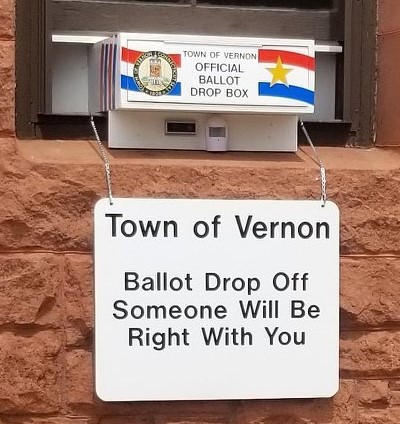Press Release
Common Cause Rhode Island Launches 2024 Election Protection Program
The COVID-19 pandemic challenged our democracy in Rhode Island and forced us to adapt quickly to maintain an open, ethical, and accountable government. Our work largely focused on maintaining transparency and accessibility as public meetings moved online. We were also focused on making sure voting rights were maintained while public health was preserved.
We were living in an unprecedented time. The COVID-19 pandemic changed our world overnight. Despite these challenges we remained focused on ensuring our democracy continued to function; people responded to the 2020 Census, public meetings allowed the same level of participation as they moved online and that our 2020 elections were held safely and securely.
Rhode Island voters traditionally voted at polling places on Election Day. With the onset of the COVID-19 pandemic it became clear that voters needed to have options for voting safely. Common Cause Rhode Island hosted a webinar with election experts from around the country explaining how the Ocean State can pivot to provide voters with additional options.
Starting with the April 28th Presidential Preference Primary along with allies we provided suggestions for the Rhode Island Board of Elections. The Presidential Preference Primary–moved to June 2nd–was largely a success. More than 80 percent of voters cast their ballots by mail, up from less than five percent in 2016. There were problems with some voters not receiving requested ballots, or not receiving ballots at the correct address.
In June we supported the Safe and Healthy Voting in 2020 Act a comprehensive bill to create a real system of early voting, and expand access to mail ballots. The General Assembly did not take up the bill. In July the General Assembly reconvened and we won a victory when the General Assembly did make changes to the emergency mail ballot process that made voting safer and more secure.
The General Assembly did fail to act on a bill to expand access to mail ballots, and as a result we filed a lawsuit, along with the League of Women Voters of Rhode Island and three individual plaintiffs. That lawsuit asked to set aside during the pandemic the requirement that voters have two witnesses or one notary public sign their mail ballot. That lawsuit made it all the way to the U.S. Supreme Court where we won.
In September the state held a successful statewide primary and Secretary of State Nellie Gorbea decided to send mail ballot applications to all registered voters.
The November election was a success, with Rhode Island setting modern records for voter turnout.
On March 16, 2020, Governor Gina Raimondo issued Executive Order 20-05 suspending the requirement that public bodies (i.e. state and municipal boards including city and town councils) meet in person. Common Cause Rhode Island, along with the RI ACLU, immediately provided feedback to the administration asking for changes to her order. On March 24, 2020 the Department of Administration issued guidance based on our suggestions.
On March 31st, we hosted a training with Leadership Rhode Island and the League of Cities and Towns for more than 300 municipal officials with lessons for how to hold online public meetings. On April 15, 2020, we sent a second letter to Governor Raimondo urging further changes to renewal of EO 20-05 and on April 17, 2020 she issued EO 20-25 again incorporating some of our suggestions. That executive order was renewed on May 15, 2020.
Attorney General Peter Neronha offered useful guidance on the new executive order. The Department of Business Regulations created a guide for holding a public meeting using the Zoom conferencing platform. Common Cause laid out four principles for transparent and accessible government. Those include public notice, observation, participation and deliberation. Details of what those should look like are in the downloadable document.
Over the next 18 months Governor Raimondo followed by Governor McKee issued various executive orders renewing and narrowing the exception to hold public meetings online. In 2022 there was an unsuccessful attempt to codify the practice in law. Currently, with very limited exceptions, members of public bodies may not participate virtually, though public bodies may allow the public to participate virtually.
A complete 2020 Census is essential: it decides how many federal dollars our communities will receive for critical resources like schools, roads, and – especially important today – hospitals. Census data are also used to determine how much Congressional representation we get and to conduct redistricting in the state.
Common Cause Rhode Island, as a member of the Rhode Island Statewide Complete Count Committee worked closely to make sure census outreach continued during the pandemic.
On June 12th we launched the Safe and Healthy Voting in 2020 Act with 16 partner organizations. We held a press conference.
Speakers included:
Secretary of State Nellie Gorbea
Dr. Sarah Fessler of the Rhode Island Medical Association
Steven Brown of the ACLU Rhode Island
Jim Vincent of the Providence Branch of NAACP.
______________________________________________________
The COVID-19 pandemic has moved public meetings online. On May 20th we held a special Demystifying Democracy event exploring Government Transparency in the Time of the COVID-19 Pandemic.
Panelists included:
Abel Collins, Council President of South Kingstown
Shawn Selleck, City Clerk of Providence
Steve Ahlquist, Journalist for Uprise RI
______________________________________________________
With the onset of the COVID-19 pandemic many states are exploring how to increase the use of mail ballots to hold successful elections.Common Cause Rhode Island hosted a webinar on April 19th, Voting by Mail During the COVID-19 Pandemic. We discussed what it takes to successfully transition a state to using primarily mail ballots featuring national experts.
Panelists included:
Elena Nunez, Director of State Operations and former ED Colorado Common Cause
Jennifer Morrell, Consultant and former Deputy of Elections, Arapahoe County, CO
Noah Praetz, Consultant and former Director of Elections, Cook County, IL
Press Release
News Clip
News Clip
